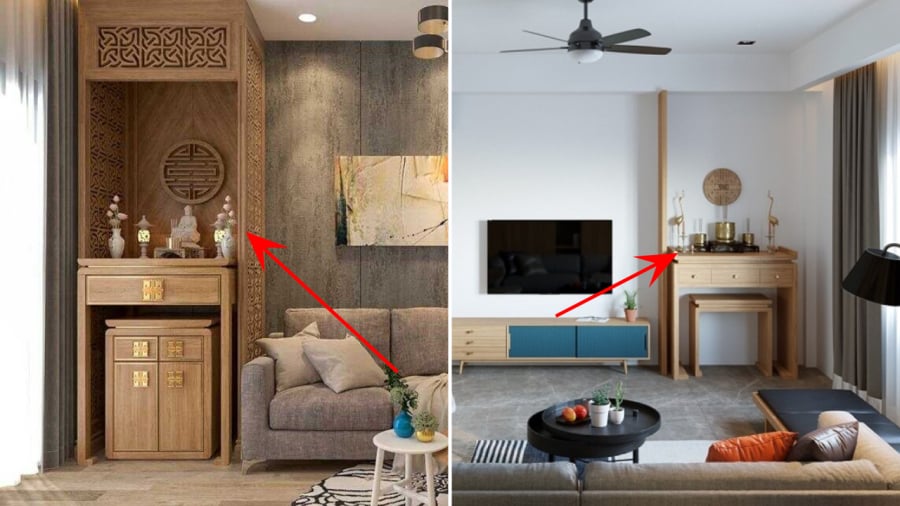The altar, a sacred space for worshipping deities and ancestors, holds a special significance in a home. The placement of the altar should be carefully considered by the homeowner to facilitate worship while avoiding any feng shui missteps. For apartments, where space is often limited, dedicating a separate room for worship may not be feasible. In such cases, homeowners must find an appropriate location for the altar.
The Best Location for an Altar in an Apartment
According to feng shui expert Nguyen Song Ha, in smaller homes or apartments, it is common to place the altar in the living room. With this arrangement, homeowners can create a relatively separate space for worship by using curtains, light partitions, or dedicated altar cabinets. This ensures the solemnity and tranquility of the worship area.
To maintain harmony, the worship area should avoid using colors that are too prominent compared to other furniture in the room. Lighting around the altar should be regulated, avoiding direct and strong light sources.
Avoid placing the altar near windows or balconies that receive direct sunlight. If this is unavoidable, use curtains or partitions to diffuse the strong light. Only moderate lighting is needed in the worship area to maintain the desired tranquility and solemnity.
Homeowners should also determine the direction of the altar. The best practice is to refer to the Bát Quái (eight trigrams) in feng shui. The altar in an apartment can face either the auspicious direction according to the homeowner’s age or an auspicious direction according to the eight trigrams.
It is essential to avoid certain positions, such as facing the kitchen, bathroom, front door, or the reverse direction of the house. These locations are not suitable for altar placement.

3 Locations to Avoid for an Altar in an Apartment
- Hanging the altar above an aquarium
In apartments, space-saving solutions like hanging altars are common. However, some people hang the altar right above the aquarium, which, according to feng shui experts, creates a “god-under-water” situation that affects the family’s fortune and future.
The aquarium symbolizes movement and dynamism, while the altar requires stillness and tranquility. Placing them together creates a conflicting environment.
- Placing the altar next to the television
The altar should not be placed next to or above the television. The loud sounds and vibrant images from the TV disrupt the tranquility and solemnity of the worship area.
- Placing the altar on an extended balcony
Some homeowners extend their balconies and use this extra space for worship. However, this is a major feng shui taboo. The altar, which symbolizes the family’s foundation, should not be placed in an unstable and precarious position. Doing so disrupts the family’s harmony and fortune, and the open balcony leaves the worship area vulnerable to weather changes.
In conclusion, for apartments, the living room is a suitable location for the altar. To ensure good feng shui, homeowners should choose an auspicious direction based on their age or the eight trigrams.
Information is for reference only.
Unleashing Financial Fortune: The 3 Golden Spots for Your Safe Deposit Box, According to Feng Shui
Introducing the ancient art of Feng Shui and its powerful impact on your wealth and prosperity. Uncover the secrets to attracting positive energy and abundance by strategically placing your safe. Discover the top 3 auspicious locations to position your safe and invite good fortune and prosperity into your home.
The Money Plant’s Golden Pot: Unlocking Abundance and Harmony for Home and Family
In the realm of feng shui and home aesthetics, the Snake Plant, also known as Mother-in-Law’s Tongue, is not just an ordinary houseplant. Its air-purifying capabilities and auspicious symbolism make it a powerful charm that attracts wealth and prosperity. Strategically placing this plant in the “feng shui golden spot” of your home is believed to bring rapid financial success, harmonious family gatherings, and smooth sailing in all aspects of life.





































